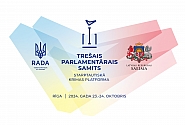
The Third Parliamentary Summit of the International Crimea Platform on 24 October in Riga will bring together delegations from approximately 40 countries around the world. Alongside the Summit, high-level expert discussions and other events in support of Ukraine will take place, including discussions dedicated to human rights issues and a screening of the documentary The True History of Crimea.
Wednesday, 23 October
11:00–12:30 Expert discussion Deportation of the Crimean Tatar People in 1944: from Recognition of Genocide to the Restoration of Crimean Tatar Rights within the Ukrainian State
Venue: Museum of the Occupation of Latvia, Assembly Hall, Latviešu strēlnieku laukums 1, Riga
On the eve of the Summit, experts will discuss how to restore the rights of the Crimean Tatar people in an independent Ukraine. Participants will focus on the international recognition of the deportation of Crimean Tatars as genocide, including the involvement opportunities of other countries in the recognition process.
Discussion participants and speakers include Mustafa Dzhemilev, leader of the Crimean Tatar people, human rights activist, long-term political prisoner in Soviet prisons and labour camps, Member of the Verkhovna Rada of Ukraine; Nariman Dzhelyal, First Deputy Chairman of the Mejlis of the Crimean Tatar People, imprisoned by the Kremlin and later liberated in the prisoner exchange of June 2024; Refat Chubarov, Chairman of the Mejlis of the Crimean Tatar People, and others.
In 1944, the Soviet regime forcefully relocated approximately 200 thousand Crimean Tatars to Central Asia and other remote areas of the USSR. In 2019, the Latvian Parliament recognised this crime as genocide committed by the Soviet regime with the aim of destroying the ethnic, cultural, and religious identity of the Crimean Tatar people. For decades, Crimean Tatars fought for return to their ancestral land, which only became possible first in the late 1980s. However, Russia occupied Crimea in 2014, since then continuing to violate the rights of the Crimean Tatar people, persecuting activists, and banning the work of the Mejlis.
The event is hosted by the Embassy of Ukraine in the Republic of Latvia.
17:30–20:30 Screening of the documentary The True History of Crimea
Venue: House of the Blackheads, Rātslaukums 7, Riga
Wednesday’s programme will conclude with the screening of the documentary The True History of Crimea and a discussion with the authors of the film as well as representatives from Crimea.
Opening remarks by Daiga Mieriņa, Speaker of the Saeima; Ruslan Stefanchuk, Chairman of the Verkhovna Rada of Ukraine; Refat Chubarov, Chairman of the Mejlis of the Crimean Tatar People; Mustafa Dzhemilev, leader of the Crimean Tatar people, human rights activist, long-term political prisoner in Soviet prisons and labour camps, Member of the Verkhovna Rada of Ukraine; and Vilnis Ķirsis, Mayor of Riga.
The author of the documentary is Akim Galimov, Ukrainian journalist, historian, and film director. The film debunks myths about Crimea and reveals its true history. The documentary highlights the extent to which Russian propaganda and colonisation policy have destroyed the identity and culture of the indigenous peoples of Ukraine.
The event is hosted by the Embassy of Ukraine in the Republic of Latvia.
Thursday, 24 October
15:00–18:00 Expert discussion on Russia’s accountability and the impact of the war on European security
Venue: Hotel Radisson Blu Latvija, Elizabetes iela 55, Riga
Experts will explore possibilities to do justice for the victims of international crimes to guarantee stable peace. In addition, the discussion will focus on the development of a national resilience strategy and opportunities for partner countries to adapt lessons from Ukraine.
The discussion is hosted by the Crimean Human Rights Group, the Latvian Institute of International Affairs, and the Latvian Platform for Development Cooperation. Opening remarks by Daiga Mieriņa, Speaker of the Saeima; Ruslan Stefanchuk, Chairman of the Verkhovna Rada of Ukraine; and Olha Skrypnyk, Co-coordinator of the Crimea Platform Expert Network.
Discussion participants include Nariman Dzhelyal, First Deputy Chairman of the Mejlis of the Crimean Tatar People, imprisoned by the Kremlin and later liberated in the prisoner exchange of June 2024; Dmytro Lubinets, Ukrainian Parliament Commissioner for Human Rights; Colonel (reserve) Viktor Kevliuk, military expert; Jānis Kažociņš, former National Security Advisor to the President of Latvia; Kristīne Līce, Legislation and International Law Adviser to the President of Latvia, and others.
The event will be broadcast live on the Summit website and on the YouTube account of the Saeima.
For media consideration:
Media accreditation is required to access the events of the Summit.
For more information, please visit the Summit website: https://crimea-platform-riga.lv/.
Saeima Press Service









